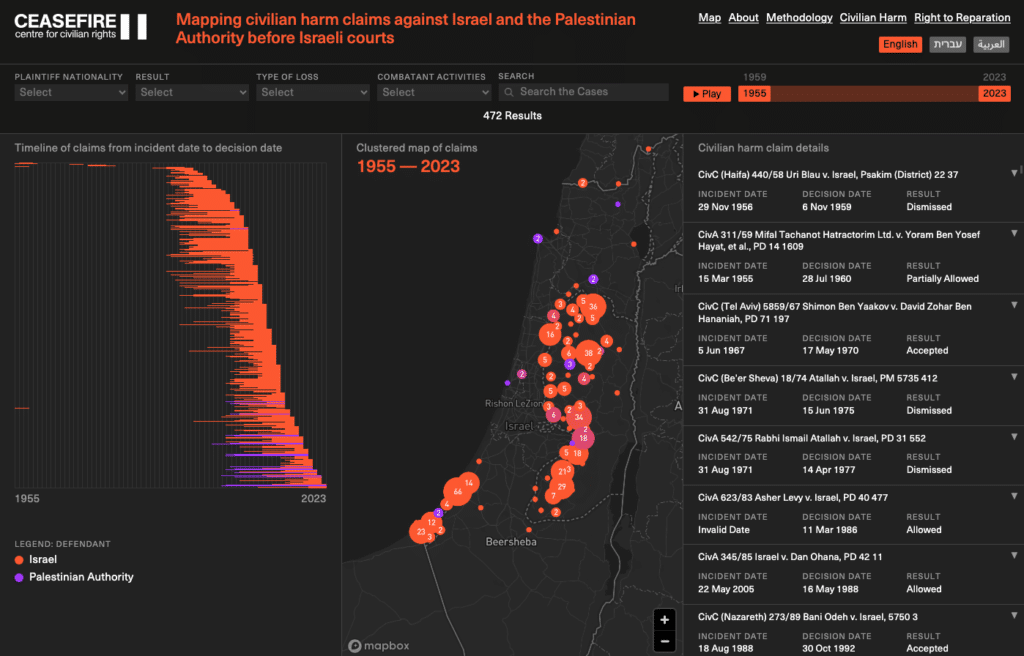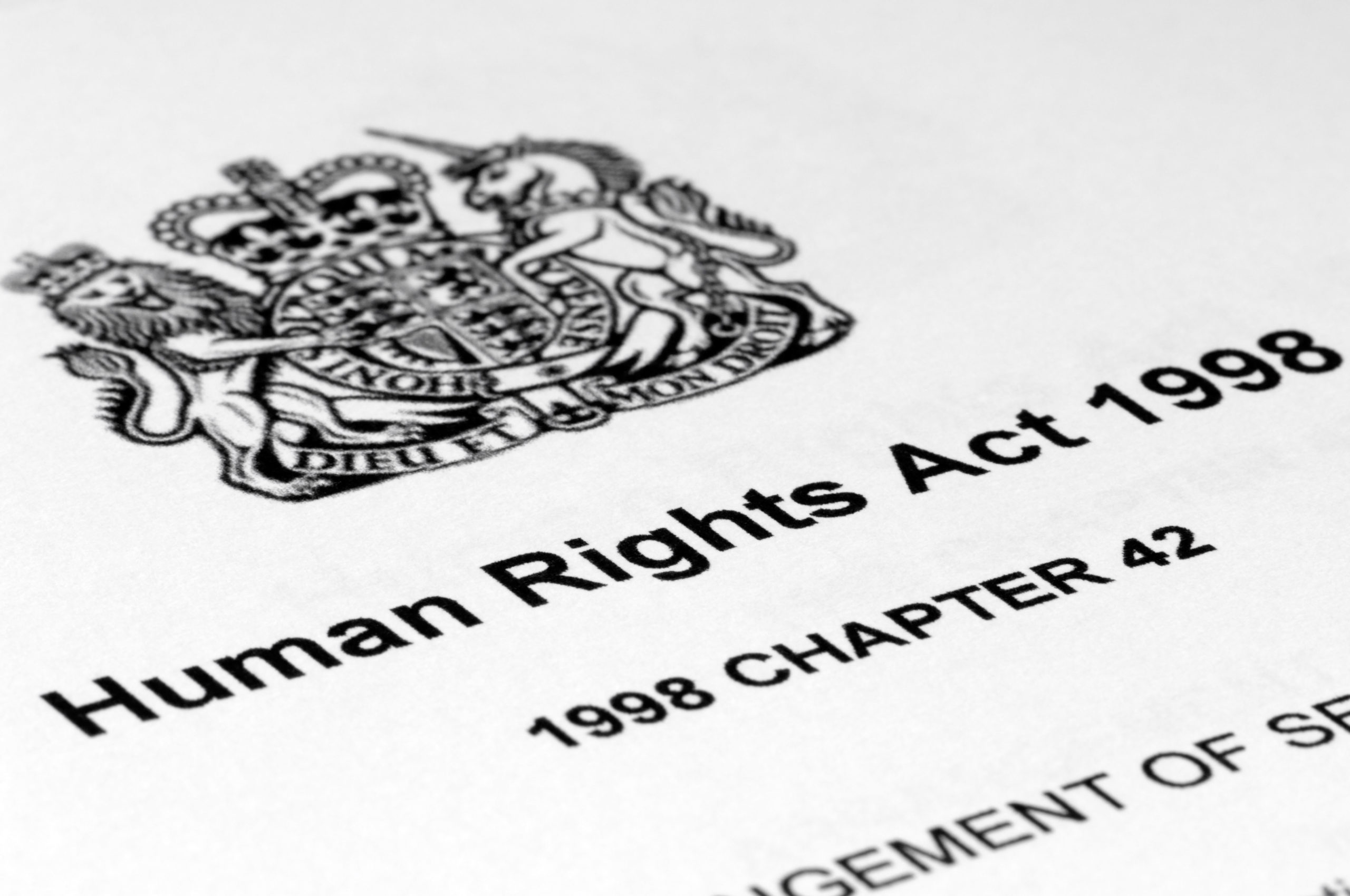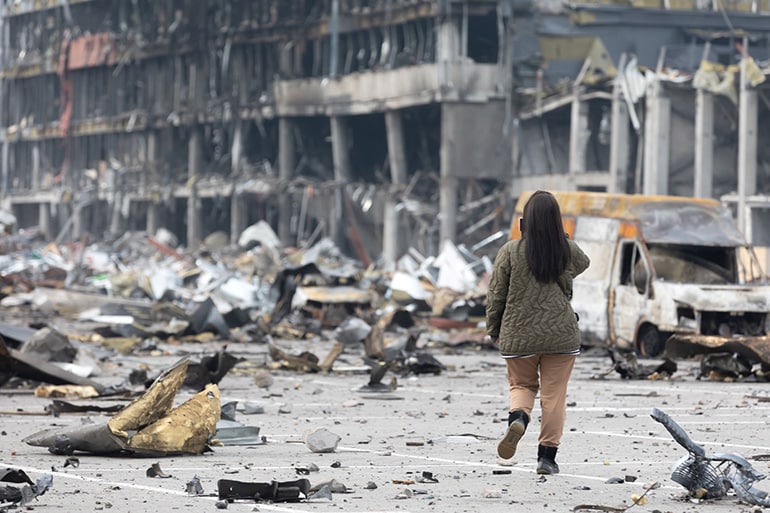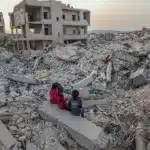The operation of the Israeli justice system is now effectively shielding Israeli Security Forces (ISF) from accountability for civilian harm caused in the Occupied Palestinian Territories (OPT), shows a new map of nearly 500 Israeli court cases published by Ceasefire Centre for Civilian Rights.
The map of civilian harm cases over six decades illustrates that while Israel’s courts awarded 24.4 million in compensation and costs for death, injury and property damage in 78 successful claims, over the last ten years access to justice for Palestinians has been severely constrained. By contrast, in recent years Israeli courts have awarded 438.7 million in compensation and costs in 24 successful claims against the Palestinian Authority.
The right to a remedy for the Palestinian population in the West Bank and Gaza has been progressively limited, including through a series of procedural obstacles, high court fees and securities, the denial of entry permits to access court, and the designation of Gaza as enemy territory. The greatest impact, however, has been the growing use of an exception in the law of tort covering ‘combatant activities’, rendering the state of Israel immune from liability in such cases. A series of amendments passed by the Knesset between 2000 and 2012 widened the definition of the combatant activities exception to cover not just combat activities in the normal sense but policing activities and actions of the civil administration in support of security goals.
‘The effects of the expansion of the combatant activities exception are clear,’ said Dr Haim Abraham of University College London, co-lead researcher on the database. ‘The Israeli legislature repeatedly broadened the scope of Israel’s immunity from liability to the extent that it is nearly impossible for claims against it to succeed and courts have rejected about nine out of ten claims. Simultaneously, Israeli courts have been far more lenient towards claims against the Palestinian Authority.’
‘While Jewish Israeli citizens who are residents of the OPT have a right to claim compensation for losses they sustain from the operations of Israel’s security forces, non-Jewish residents effectively have no corresponding right,’ said Professor Gilat Bachar of Temple University School of Law, co-lead researcher. ‘That raises serious questions about equality before the law.’
The killing of Palestinian journalist Shireen Abu Akleh in May 2022 prompted a rare level of international media interest, but was not an isolated event. Already in 2023, 174 Palestinians and 14 Israelis have been killed according to UN OCHA.
The UN Basic Principles and Guidelines on the Right to a Remedy and Reparation for Victims of Gross Violations of International Human Rights Law and Serious Violations of International Humanitarian Law confirm that victims have a right to equal and effective access to justice, and to adequate, effective and prompt reparation for harm suffered, including in the context of armed conflict or occupation.
‘When Palestinians in the OPT are killed, maimed or see their houses destroyed they have a right to justice, just as Israeli citizens do,’ said Mark Lattimer, Executive Director of Ceasefire. ‘Accountability for civilian harm should not be avoided by classing law enforcement as combat.’
Notes for editors:
1. Mapping civilian harm claims against Israel and the Palestinian Authority before Israeli courts, published on 19 July 2023 in English, Hebrew and Arabic, presents over 470 Israeli court cases in which civilians sought compensation under tort law for loss of life, bodily injury and property damage inflicted during armed activities. The vast majority of cases involve Palestinian civilians who were injured by Israeli security forces in the Gaza Strip and the West Bank. However, the database includes claims of other nationals, as well as cases in which Israeli civilians sought compensation against Hamas and the Palestinian Authority for losses incurred during hostilities.
The map is online at: https://civilian-harm-map.ceasefire.org/
2. The project is a collaboration between Dr Haim Abraham (UCL Faculty of Laws), Prof Gilat Bachar (Temple University Beasley School of Law) and Ceasefire Centre for Civilian Rights. Map designed by Rectangle.
3. The database has been made possible through support from UCL Laws, UCL Public Policy, UCL’s Private Law Group, UKRI Research England, and the University of Haifa Minerva Center for the Rule of Law Under Extreme Conditions.























